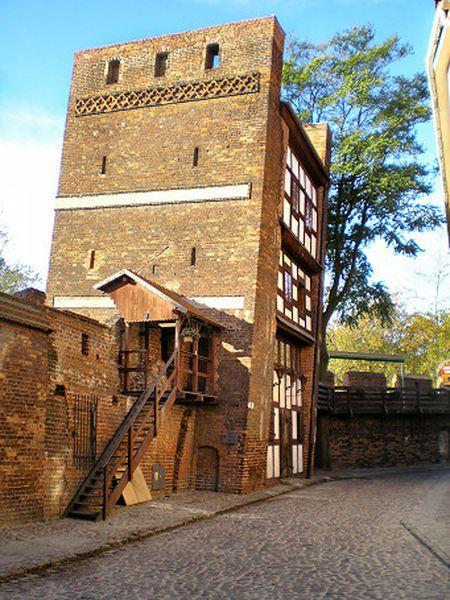The period of Toruń’s greatest glory had already passed when the astronomer-to-be was born.
What reminded people of the past splendor were the slender walls of churches and of merchants' houses as well as the city hall in the middle of the market square together with its high tower from which one could admire a view of the whole town and its surroundings. In the second half of the fourteenth century the Toruń merchants were present on trade routes all over Europe. They transported copper from the mines in today’s Slovakia, skins from Russia as well as wood, tar, potash, and wax from the Tuchola Forest to the ports of Western Europe. They brought to Prussia and Poland herring from the Norwegian ports, cloth from Flanders and England, wine from Westphalia and the Iberian Peninsula. They were active members of the Hanseatic League, a trade association of cities, participated in its meetings, maintained their own sales office in what was the most important market town at this time in Flanders – Brugge. At the end of the fourteenth century the economic boom came to an end. The citizens of Gdańsk eliminated Torunians from the seas by blocking the free entry to the Baltic Sea to ships from Toruń. Nuremberg merchants started to transport Slovakian copper to Germany via land routes. Toruń was being transformed from a supraregional mercantile centre to a city that was a trade agent between Gdańsk and other lands of the Polish Kingdom.
In the second half of the fifteenth century, when the highly profitable gains from the deep-sea trade in copper, wax, leather, and wood remained a memory only, the proud city continued to fight for its position and the maintenance of extensive privileges, obtained from both the Teutonic Knights and the graciously reigning Casimir Jagiellon. Toruń had the staple right for all the goods exported from the Polish lands to Gdańsk. The merchants transporting those goods had to sell them in Toruń at significantly lower prices than in the port on the Motława River. The Torunians had to fight the contraband of Polish and Silesian traders who tried to pass by their hometown, to eliminate the unfavorable agency. Armed troops of Torunians controlled the roads to Gdańsk running through the Tuchola Forest and took over the law-breakers’ goods.
However, those actions were not very successful for the old patrician families. The city purse was slow to pay back the huge sums involved in the war with the Teutonic Knights and the attempts at the continuation of oversees trade usually ended in bankruptcy. The patricians of the old merchant families lost their revenues and offices, moved to the country, and spent their old age in shelters for impoverished merchants. They were replaced with new people who had made fortunes in the war or who could better adapt to the new economic conditions.
Despite those problems, Toruń was a city of educated people. It had a school whose rectors belonged to the intellectual elite of the time. In the fifteenth century, more and more young people from Toruń went to study at universities. One of the best educated families in the city were the maternal ancestors of Copernicus – the Watzenrods. Cezary, the astronomer’s grandfather's brother, obtained the degree of doctor of medicine. His cousins from another line, Frederick III and Frederick IV, also graduated from universities. It is also probable that the astronomer’s grandfather, Lucas the Elder, studied at the University of Leipzig.
Lucas Watzenrode, Copernicus’s uncle who later became the bishop of Warmia, studied at as many as five universities in Poland, Germany and Italy. Still earlier, two priests from Toruń reached the highest Church dignities – Silvester Stodewascher became archbishop of Riga, and Joannes Abezier - Bishop of Warmia. The city upon Vistula gave its young inhabitants excellent opportunities to study and foundations to continue their education at the universities in Kraków and other European cities.
Bibliography:
- Historia Torunia, ed. M. Biskup, v. 1, Toruń 1999.
- Mikulski, Nicolaus Copernicus. Life and work, Toruń 2009.
- Mikulski, Przestrzeń i społeczeństwo Torunia od końca XIV do początku XVIII wieku, Toruń 1999.
- Rymaszewski, Toruń in the days of Copernicus. Urban development, architecture, art, Toruń 1973.
 English (United Kingdom)
English (United Kingdom)  Polski (PL)
Polski (PL) 






